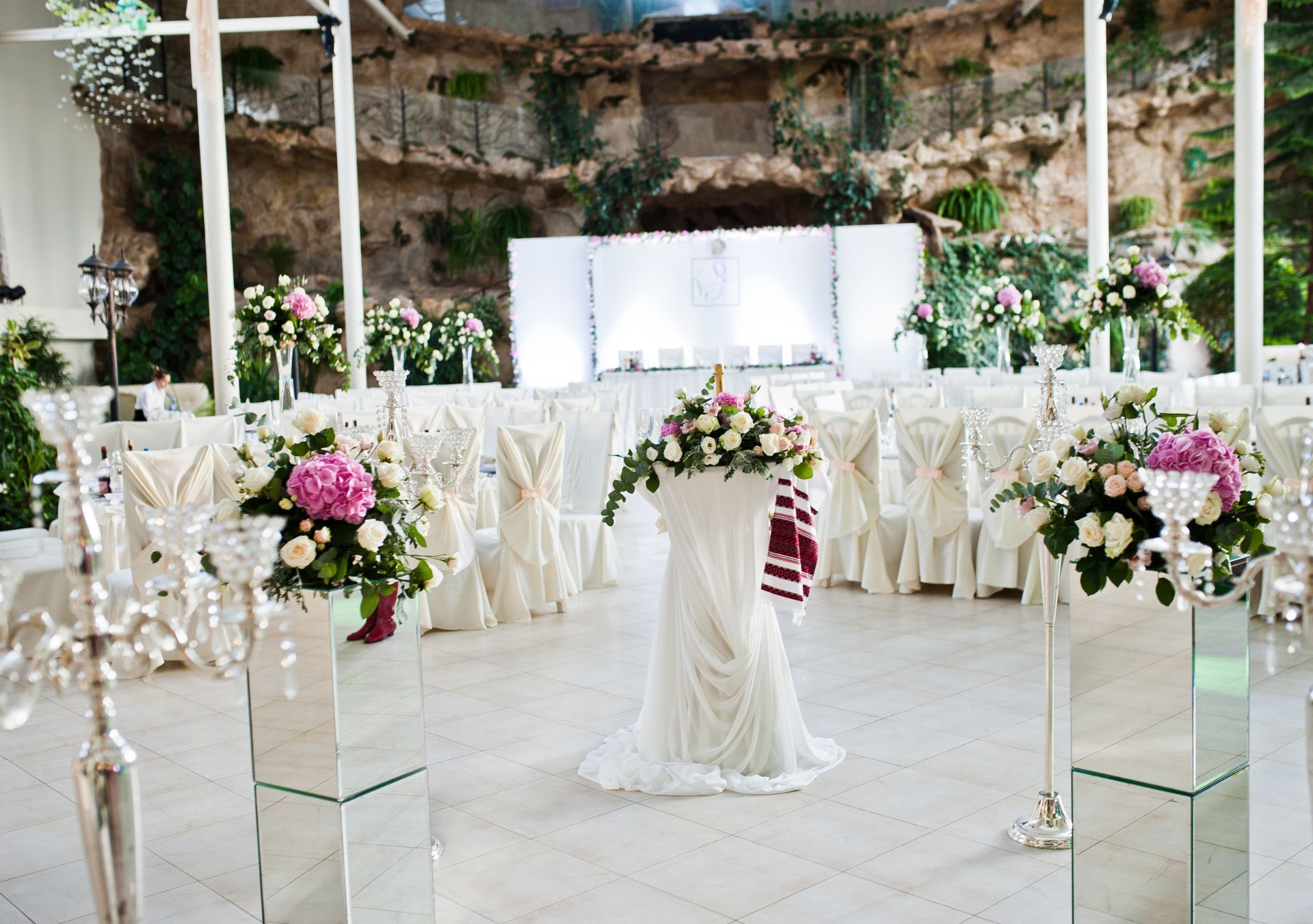
Most Common Business Policies
Index
Contact Us
When planning a wedding or special event, securing the right venue is paramount. However, the importance of protecting that venue with adequate insurance cannot be overstated. Wedding and event venue insurance serves as a safety net, safeguarding against potential risks that could disrupt the occasion. This article delves into the essentials of venue insurance, covering everything from its significance to the various types of coverage available.
Understanding Venue Insurance
Venue insurance is a specialized form of coverage designed to protect event spaces from a range of liabilities and unforeseen incidents. This insurance is crucial for both venue owners and event planners, as it provides financial protection against potential losses that could arise during an event.
What Does Venue Insurance Cover?
Typically, venue insurance covers a variety of incidents, including property damage, personal injury, and cancellation of events. For instance, if a guest were to slip and fall on the premises, the insurance can cover medical expenses and legal fees. Additionally, if a natural disaster forces the cancellation of an event, the policy may reimburse the venue for lost income.
Moreover, some policies also offer coverage for equipment and furniture damage, which is particularly important for venues that host multiple events. This ensures that any necessary repairs or replacements can be made without incurring significant out-of-pocket expenses. Furthermore, some insurance plans may also include coverage for loss of use, which can be critical if the venue becomes temporarily unusable due to damage or repairs, allowing owners to recover some of the lost rental income during that period.
Why Is Venue Insurance Important?
Having venue insurance is not just a precaution; it is often a requirement. Many vendors, including caterers and photographers, may require proof of insurance before agreeing to work at a venue. This requirement helps protect all parties involved and ensures that everyone is covered in case of an incident.
Furthermore, the financial implications of an uninsured event can be devastating. Without insurance, a venue owner could face lawsuits, repair costs, and loss of income, which could potentially lead to bankruptcy. Therefore, investing in venue insurance is a wise decision that can save significant financial strain in the long run. Additionally, the peace of mind that comes with having insurance can allow venue owners and event planners to focus on creating memorable experiences for their clients, rather than worrying about what might go wrong. This focus on the event itself can lead to better service, enhanced reputation, and ultimately, more business opportunities in the future.

Types of Venue Insurance
There are several types of insurance policies available for wedding and event venues, each tailored to meet specific needs. Understanding these different types can help venue owners and event planners choose the right coverage.
General Liability Insurance
General liability insurance is a fundamental type of coverage that protects against claims of bodily injury or property damage. This is essential for any venue, as it shields the owner from lawsuits resulting from accidents that occur on the premises.
For example, if a guest accidentally damages a piece of art or equipment, general liability insurance can cover the costs associated with the damage. Additionally, it can also cover legal fees if the venue is sued due to an incident that occurs during an event. This type of insurance not only safeguards the venue financially but also enhances its reputation, as clients are more likely to choose a venue that demonstrates a commitment to safety and responsibility.
Property Insurance
Property insurance covers the physical assets of the venue, including the building itself, furniture, and equipment. This type of insurance is crucial for protecting against losses due to theft, vandalism, or natural disasters.
For instance, if a severe storm damages the roof of a venue, property insurance would help cover the costs of repairs. This ensures that the venue can continue operating without significant financial setbacks. Moreover, property insurance can also extend to cover loss of income due to business interruption, allowing venue owners to maintain financial stability while repairs are being made. This aspect is particularly vital for venues that rely heavily on bookings during peak seasons, as any downtime can significantly impact revenue.
Event Cancellation Insurance
Event cancellation insurance is designed to protect against financial losses resulting from the cancellation of an event due to unforeseen circumstances. This could include anything from extreme weather conditions to a sudden illness affecting key participants.
Having this type of insurance can provide peace of mind, knowing that if an event must be canceled, the financial investment is not entirely lost. It can cover expenses such as deposits paid to vendors and lost revenue from ticket sales. Additionally, many policies can be customized to include coverage for specific risks relevant to the venue's location or type of events hosted, such as coverage for acts of terrorism or pandemics, which have become increasingly important in recent years. By investing in
event cancellation insurance, venue owners can not only protect their financial interests but also foster trust with clients, knowing they are taking proactive steps to mitigate potential risks associated with event planning.
Choosing the Right Coverage
Choosing the right insurance coverage for a wedding or event venue can be a daunting task. Several factors need to be considered to ensure that the selected policy meets the specific needs of the venue.
Assessing Risks
The first step in choosing the right coverage is to assess the risks associated with the venue. This includes evaluating the location, the type of events hosted, and the potential hazards that could arise. For instance, venues located in areas prone to natural disasters may require additional coverage for those specific risks.
Additionally, understanding the types of events hosted can also influence coverage needs. A venue that frequently hosts large gatherings may need higher liability limits compared to one that hosts smaller, more intimate events. It is also essential to consider the unique features of the venue itself, such as swimming pools, expansive outdoor spaces, or historical structures, as these can introduce additional liabilities that need to be addressed in the insurance policy.
Consulting with Insurance Professionals
Consulting with an insurance professional can provide valuable insights into the types of coverage available and help identify the best options for a specific venue. These experts can assess the unique needs of the venue and recommend policies that offer adequate protection.
Furthermore, they can help navigate the complexities of insurance jargon, ensuring that venue owners fully understand the terms and conditions of their policies. This knowledge is crucial for making informed decisions regarding coverage. In addition to understanding the policy details, insurance professionals can also advise on risk management strategies, such as implementing safety protocols or staff training, which can help reduce the likelihood of claims and potentially lower insurance premiums over time.
Comparing Policies
Once the risks have been assessed and consultations have taken place, it’s essential to compare different insurance policies. This involves looking at coverage limits, deductibles, and premiums from various providers.
By comparing policies, venue owners can find the best coverage at a competitive price. It’s also important to read reviews and testimonials from other venue owners to gauge the reliability and customer service of potential insurance providers. Additionally, considering the claims process and the insurer's reputation for handling claims efficiently can be a deciding factor. A policy that offers comprehensive coverage but is difficult to navigate during a claim may not be as beneficial as one with slightly less coverage but a more user-friendly claims experience. This thorough comparison process ensures that venue owners are not only protected but also supported in the event of an incident.

Common Exclusions in Venue Insurance
While venue insurance provides essential coverage, it is crucial to be aware of common exclusions that may not be covered by standard policies. Understanding these exclusions can help venue owners avoid unexpected financial burdens.
Acts of God
Many insurance policies include exclusions for acts of God, which refer to natural disasters such as earthquakes, floods, and hurricanes. While some policies may offer additional coverage for these events, it often comes at a higher premium.
Venue owners in areas prone to such disasters should consider investing in supplemental coverage to protect against these risks. This proactive approach can save significant costs in the event of a disaster. Additionally, it is wise for venue owners to conduct regular risk assessments and develop emergency response plans tailored to their specific geographical vulnerabilities. By doing so, they not only enhance safety but also demonstrate to insurers that they are taking responsible steps to mitigate risks, potentially leading to lower premiums.
Negligence
Insurance policies typically do not cover incidents resulting from negligence on the part of the venue owner or staff. For example, if a venue fails to maintain safe conditions and a guest is injured as a result, the insurance may not cover the claim.
To mitigate this risk, venue owners should implement strict safety protocols and ensure that staff is trained to handle emergencies effectively. This not only protects guests but also safeguards the venue against potential liability claims. Regular training sessions, safety drills, and thorough documentation of maintenance activities can serve as evidence of due diligence in the event of a claim. Furthermore, engaging with a risk management consultant can provide valuable insights into best practices and help develop a comprehensive safety strategy that aligns with industry standards.
Alcohol-Related Incidents
Alcohol-related incidents can be a significant concern for event venues. Many insurance policies may exclude coverage for damages or injuries resulting from the consumption of alcohol. This is particularly relevant for venues that serve alcohol at events.
To address this exclusion, venues may consider adding a liquor liability policy, which specifically covers incidents related to alcohol service. This additional coverage can provide peace of mind for venue owners and ensure that they are protected against potential claims. Moreover, implementing responsible alcohol service practices, such as training staff in responsible serving techniques and monitoring guest consumption, can further reduce the likelihood of incidents. Establishing a clear policy for managing intoxicated guests not only enhances safety but also reinforces the venue’s commitment to providing a secure environment for all attendees, which can be a significant selling point when marketing the venue to prospective clients.
Cost of Venue Insurance
The cost of venue insurance can vary significantly based on several factors, including the size of the venue, the types of events hosted, and the coverage limits selected. Understanding these factors can help venue owners budget effectively for their insurance needs.
Factors Influencing Insurance Costs
Several key factors influence the cost of venue insurance. These include:
- Location: Venues in high-risk areas may face higher premiums due to the increased likelihood of claims.
- Size of the Venue: Larger venues that accommodate more guests may require higher coverage limits, resulting in increased costs.
- Type of Events: Venues hosting high-risk events, such as concerts or festivals, may face higher insurance costs compared to those hosting low-risk gatherings.
Average Premiums
On average, venue insurance premiums can range from a few hundred to several thousand dollars annually. Smaller venues may find coverage for as low as $500 per year, while larger venues with more extensive coverage needs may pay upwards of $5,000 or more.
It’s essential for venue owners to obtain quotes from multiple insurance providers to find the best rates for their specific needs. This comparison shopping can lead to significant savings while ensuring adequate protection.
Budgeting for Insurance
When budgeting for venue insurance, it’s crucial to consider not only the premiums but also any deductibles and potential out-of-pocket expenses. Venue owners should factor these costs into their overall budget to ensure they are financially prepared for any incidents that may arise.
Additionally, setting aside a contingency fund for unexpected expenses can provide an extra layer of financial security. This proactive approach can help venue owners navigate any unforeseen challenges with confidence.
Moreover, it is advisable for venue owners to regularly review their insurance policies and adjust coverage as necessary. As the venue evolves—whether through renovations, changes in capacity, or the introduction of new types of events—the insurance needs may also change. Keeping an open line of communication with insurance agents can ensure that venue owners are always aware of the best options available to them, potentially leading to better coverage at competitive rates.
Furthermore, many insurance providers offer risk management resources that can help venue owners minimize potential liabilities. By implementing safety protocols, conducting regular inspections, and training staff on emergency procedures, venues can not only enhance their safety measures but may also qualify for discounts on their insurance premiums. This proactive stance not only protects the venue financially but also fosters a safer environment for guests and staff alike.
Conclusion
Wedding and event venue insurance is an essential aspect of protecting both the venue and the events held within it. By understanding the types of coverage available, assessing risks, and choosing the right policies, venue owners can safeguard their investments and provide peace of mind for their clients.
As the event industry continues to evolve, having comprehensive insurance coverage will remain a critical component of successful venue management. By staying informed and proactive, venue owners can ensure that they are well-prepared for any challenges that may arise, allowing them to focus on creating memorable experiences for their guests.
In conclusion, investing in venue insurance is not just about compliance; it is about creating a secure environment for celebrations that matter. Whether it’s a wedding, corporate event, or a community gathering, the right insurance can make all the difference in ensuring a smooth and successful occasion.
